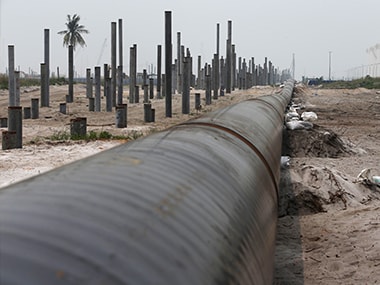“The inevitable never happens. It’s the unexpected always.” — John Maynard Keynes Psychologists describe hoarding as an emotional syndrome when people find it difficult to part with things. A sense of eternal fear of running out of things is overwhelming as also the need to pile up goods, irrespective of value or utility, resulting in a disorderly existence. That’s not the quite the case with every class of accumulator though. Deep inside the earth’s surface, in neat, uncluttered subterranean coastal caverns, many governments are quietly stocking up something that they fear may soon run out: oil. About 700 million barrels of oil currently lie in 60 underground caves located in four inconspicuous locations in the United States, which has been building its strategic petroleum reserve (SPR) since 1970. There are now many other huge oil stockpiles peppered across the globe—Japan, Belgium, the Netherlands, Spain, China and many others—with governments pumping in billions of dollars into creating such facilities. China has developed a vast network of strategic reserve facilities at multiple locations that hold an estimated 275 million barrels as of mid-2017. [caption id=“attachment_5500971” align=“alignleft” width=“380”]  Representational image. Reuters[/caption] India is a relatively recent entrant to the club building its oil stocks to deal with potential fuel supply disruptions and price shocks. On June 27, 2018, Prime Minister Narendra Modi presided over a Cabinet meeting to approve a plan to build two new caves of SPRs which, when complete and tanked up, will create additional capacity to maintain supplies for up to 11.5 days’ oil needs in an emergency. This will raise India’s crude oil storage capacity to equivalent of 87 days of demand by 2020, which include 67 days’ worth of commercial stocks held by refineries (apart from the armed forces’ stocks). One of the new caves will be built at Chandikhol, in Odisha, to store up to 4.4 million tonnes of crude oil; the other will be a 2.5-million tonne facility at Padur, Karnataka. This is besides the three SPRs India already has in Visakhapatnam, Mangaluru and Padur. The Visakhapatnam and Mangauluru facilities have been built to meet roughly 2.5 days of requirement each while Padur can meet 4.5 days’ of oil needs. These facilities can store up to 1.33 million tonnes, 1.5 million tonnes (Manguluru) and 2.5 million tonnes (Padur). The Cabinet’s decision in June to build new SPR caverns came exactly 45 days after a container ship carrying the first consignment of 2 million barrels of crude oil set sail from the United Arab Emirates (UAE) for the Mangaluru SPR. Abu Dhabi National Oil Company (ADNOC)—the only one to partner with India on its crude oil reserve programme till date—has tied up with Indian Strategic Petroleum Reserves Limited (ISPRL) (see interview) to store around 5.86 million barrels of crude oil in at the Mangaluru SPR at its own cost. This agreement was signed during Modi’s visit to the UAE in February last year. In November, ADNOC signed another agreement with ISPRL to store oil in half of the Padur strategic oil reserve site. The agreement will allow ADNOC to sell oil to local refiners but give the government of India the first right to the oil in the case of an emergency. India on its part will save on costs for importing crude to store while retaining the first right of access in an emergency. In November, the government had approved a plan allowing foreign oil companies to store oil in Padur’s strategic storage, which it estimates will help cut costs by `10,000 crore. India first decided to construct SPRs in 2004 as part of a broader strategy to deal with growing demand, stagnating domestic production, soaring global crude costs and dependence on the unsteady West Asian region for imports. Globally, though, there is increasing talk of breaking the piggy bank. The US SPR, an institution born of the first international oil supply shock of 1973, is being raided for cash. At its peak in 2009–2011, the reserve held about 727 million barrels of crude oil. This is now down to about 700 million barrels. Since 2015, the US Congress has enacted five pieces of legislation calling for the sale of SPR oil. Taken together, these authorised sales will reduce the size of the SPR to around 410 million barrels by the end of 2027. India’s approach has long been tied to oil prices, as it is a net oil importer, and rising prices are set to hit its economy. “Despite the government’s stated intention to reduce dependence on oil imports, oil will remain in demand for the next few decades,” said Shebonti Ray Dadwal, senior fellow at the Institute for Defence Studies and Analyses, New Delhi, in a recent paper Strategic Petroleum Reserves: Stocking Oil for Rainy Days.
The Narendra Modi government’s plan to build two new caves of strategic petroleum reserves in Odisha and Karnataka will take crude oil stock to 87 days of demand by 2020.
Advertisement
End of Article


)

)
)
)
)
)
)
)
)



